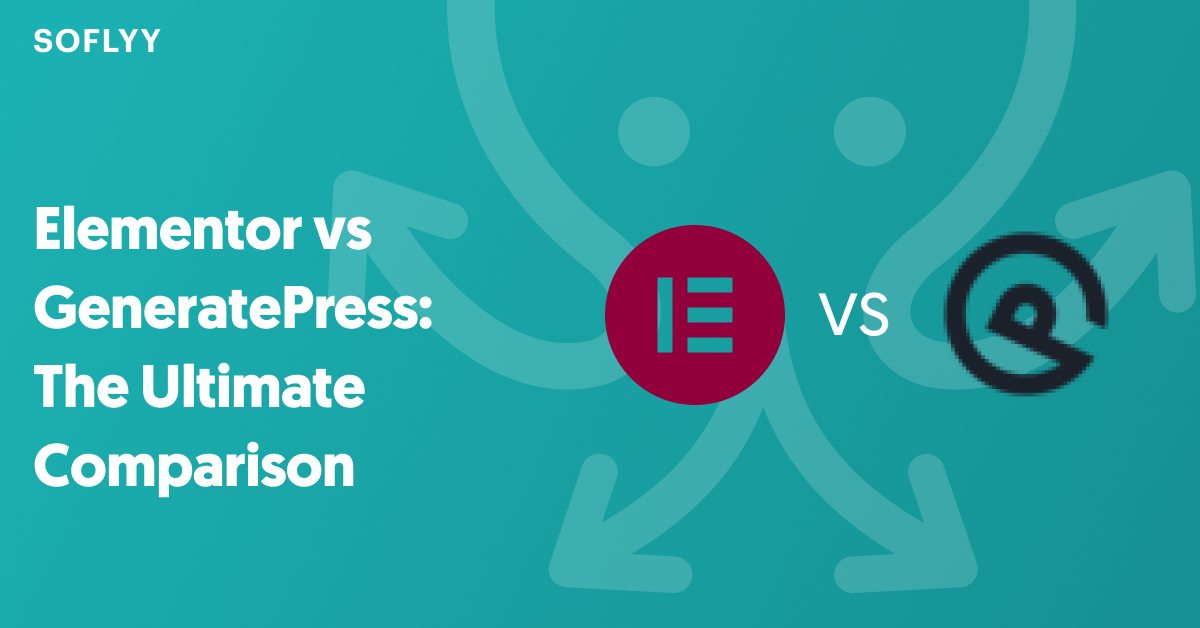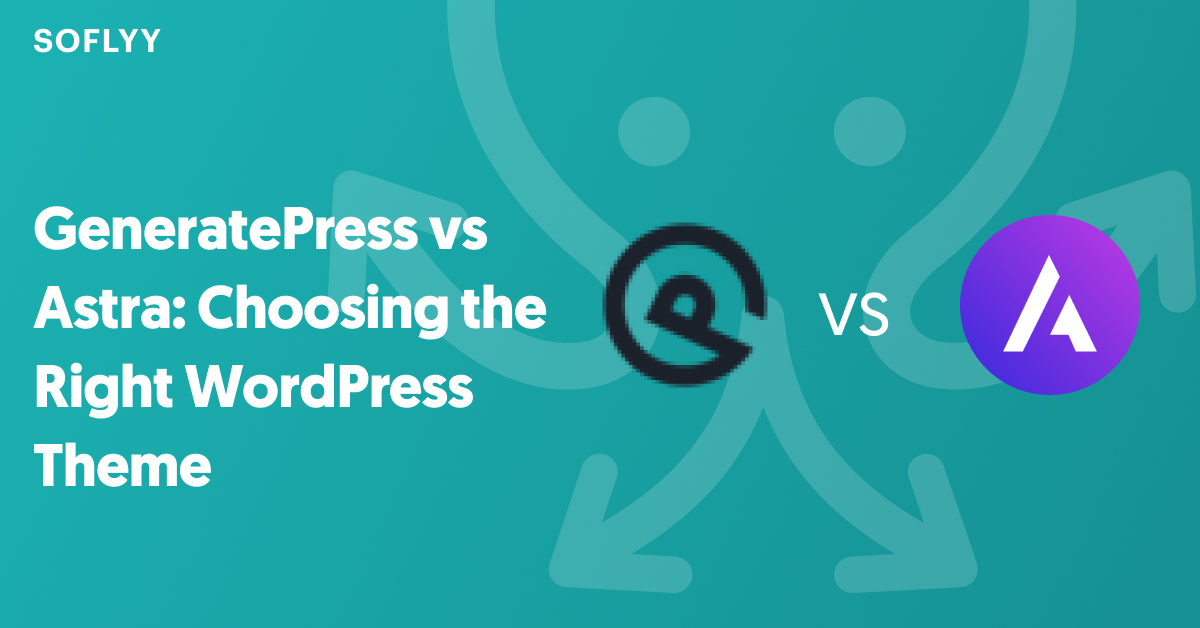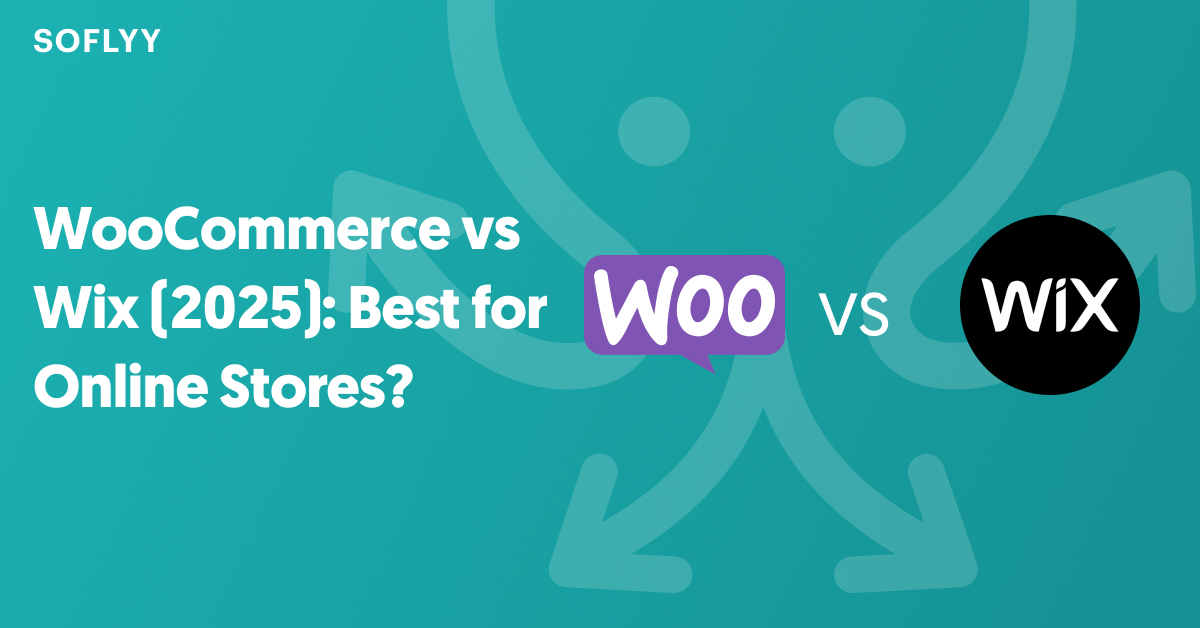In the ever-evolving world of website creation, two platforms stand out as popular choices for both beginners and experienced users: WordPress and Wix. These website builders have revolutionized the way we create and manage online content, each offering unique features and capabilities to suit different needs.
WordPress, known for its flexibility and robust content management system, has become a cornerstone of the internet. On the other hand, Wix has gained popularity with its user-friendly interface and all-in-one approach to website creation. Both platforms have their strengths and weaknesses, catering to different types of users and project requirements.
In this comprehensive comparison, we’ll explore the key features of WordPress and Wix, including ease of use, design flexibility, blogging capabilities, e-commerce functionality, plugin ecosystems, pricing structures, and more. By the end of this article, you’ll have a clear understanding of which platform might best suit your website needs.
WordPress vs Wix: Quick Comparison Table
| Factors | WordPress | Wix |
| Ease of Use | Steeper learning curve | User-friendly drag-and-drop interface |
| Design Flexibility | Unlimited design options | Design limitations |
| Blogging | Excellent content management | Basic blogging features |
| eCommerce | Highly scalable with WooCommerce | Built-in e-commerce |
| SEO-Friendliness | Excellent SEO features and plugins | Good SEO features, but may be less flexible |
| Hosting | Self-hosted (requires separate hosting) | Hosting included with subscription |
| Plugin/App Ecosystem | Vast library of plugins (50,000+) | Limited App Market |
| Community Support | Large and active community | Smaller community compared to WordPress |
| Open Source | Yes | No (Proprietary) |
| Data Portability | Easy content export in XML format | Content export in CSV format |
| Control & Ownership | Full control over site and content | Limited control, Wix owns the hosting infrastructure. |
| Pricing | Free core software; costs for hosting, premium themes, and plugins | Subscription-based with different pricing tiers |
What is WordPress?
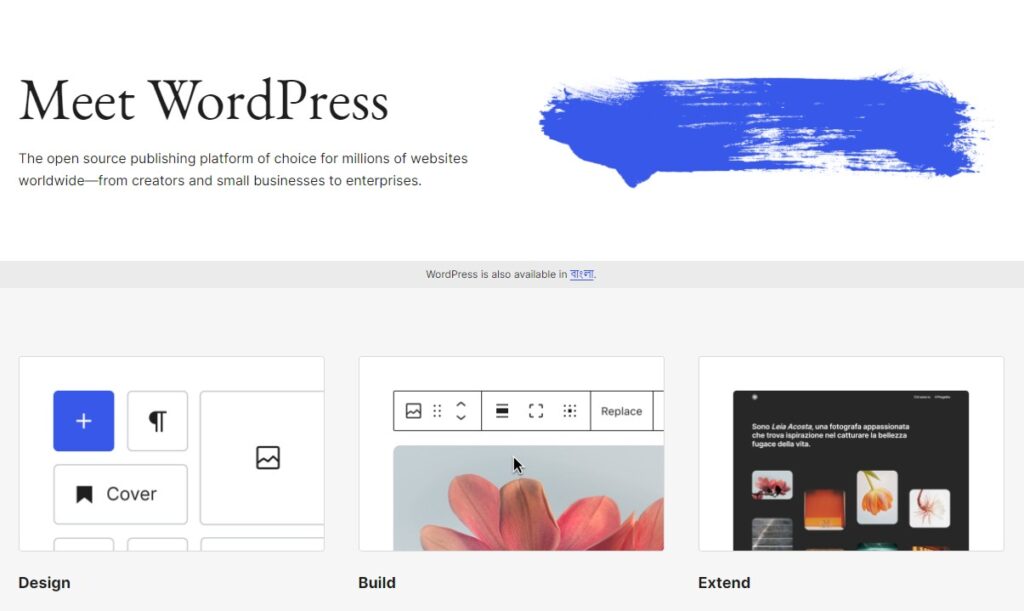
WordPress is an open-source content management system (CMS) that powers a significant portion of the internet. According to W3Techs, as of October 2024, WordPress is used by 62.5% of all websites whose content management system is known. This translates to 43.4% of all websites on the internet, making it the most popular CMS by a wide margin.
Initially launched in 2003 as a blogging platform, WordPress has evolved into a versatile CMS capable of powering various types of websites, from simple blogs to complex e-commerce stores and enterprise-level sites. Its flexibility and extensive ecosystem of themes and plugins have contributed to its widespread adoption.
It’s important to note the distinction between WordPress.org and WordPress.com. WordPress.org and WordPress.com, despite their similar names, are quite different! WordPress.org is a self-hosted platform that allows users to download WordPress software and install it on their web hosting service, giving them complete control over customization, plugins, and monetization options. This option requires users to manage their maintenance, security, and backups, making it more suitable for those with technical knowledge or specific needs. In contrast, WordPress.com is a hosted service managed by Automattic that simplifies the website creation process by offering built-in hosting, security, and maintenance.
This comparison focuses on WordPress.org, the self-hosted version that offers complete control and flexibility over your website.
Pros and Cons of Using WordPress
Pros
- Highly customizable and flexible
- Extensive library of themes and plugins
- Strong community support and resources
- Excellent for content management and blogging
- Scalable for growing websites
- Full control over your website and data
Cons
- Steeper learning curve for beginners
- Requires more hands-on management (updates, security, backups)
- Potential for higher costs with premium themes and plugins
- May require technical knowledge for advanced customization
What is Wix?
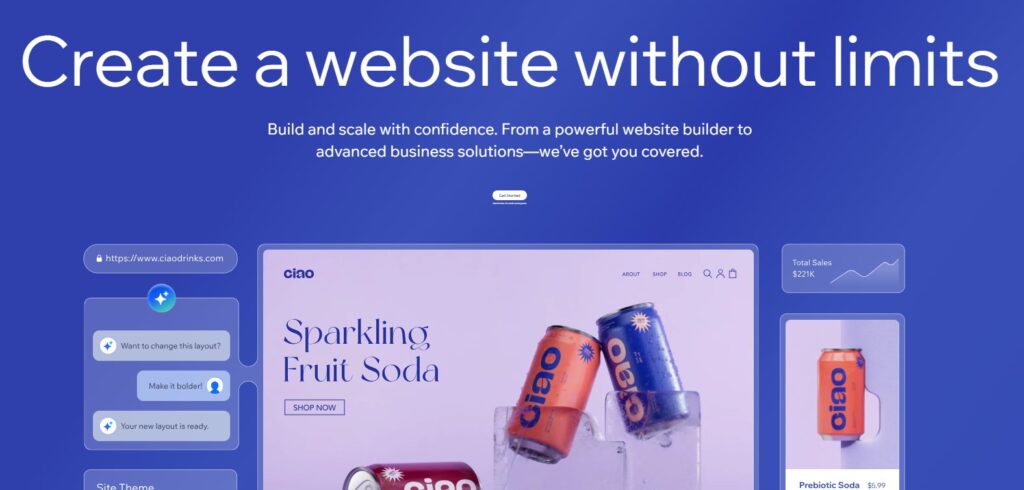
Wix is a cloud-based website builder that offers an all-in-one solution for creating and hosting websites. Founded in 2006, Wix has gained popularity due to its user-friendly drag-and-drop interface, making it accessible to users with little to no coding experience. According to W3Techs, as of October 2024, Wix is used by 3% of all websites, showcasing its growing presence as a content management system on the web.
Wix provides a comprehensive platform that includes a drag-and-drop design interface, hosting, SEO tools, and various built-in features. This allows users to create professional-looking websites without the need for extensive technical knowledge.
Pros and Cons of Using Wix
Pros
- User-friendly drag-and-drop interface
- All-in-one solution (hosting, email marketing, and live chat included)
- Wide range of pre-designed templates
- Built-in SEO tools like the SEO Wiz
- Built-in features for various website types
- No coding knowledge required
- Regular automatic updates
Cons
- Limited design flexibility compared to WordPress
- Less scalable for very large or complex websites
- Limited control over hosting and data
- Potential for higher long-term costs
WordPress vs Wix: Ease of Use
When creating and managing a website, ease of use is an important factor, especially for beginners or those with limited technical experience. Let’s compare how WordPress and Wix stack up in terms of user-friendliness and learning curve.
WordPress Ease of Use
When managing content on WordPress, the user interface is centered around the WordPress Admin Dashboard. This dashboard serves as the control center for your website, allowing access to various sections such as posts, pages, media, comments, appearance, plugins, users, and settings.
In December 2018, WordPress introduced the block editor, known as Gutenberg, to simplify the publishing experience. This modular approach allows each content element—whether a paragraph, image gallery or headline—to be treated as a separate block. This makes it easier for users to create visually appealing pages without needing to rely on shortcodes or custom HTML.
The design interface can differ significantly based on the theme or plugins you choose. WordPress themes typically adopt one of two customization methods:
- Classic themes utilize the WordPress Customizer, enabling changes to your site’s appearance through a live preview.
- Full Site Editing (FSE) themes leverage the Site Editor based on the Gutenberg block editor, offering more extensive customization options but potentially requiring a steeper learning curve.
While the default editing experience is user-friendly, you can enhance it further with page builder plugins like Breakdance. This flexibility is one of WordPress’s key advantages: you can add various plugins to enhance specific features of your website.
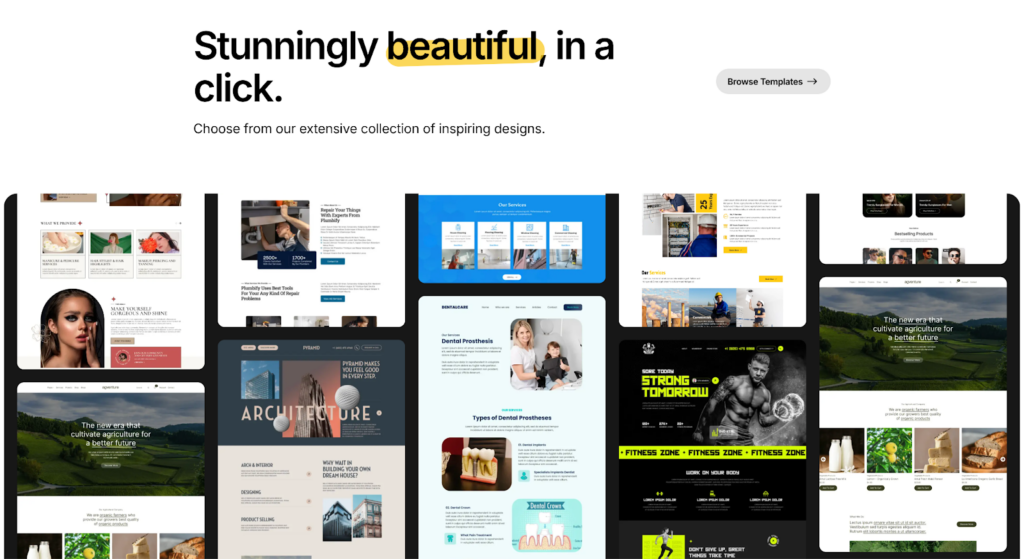
For instance, Breakdance provides an intuitive drag-and-drop interface for creating and editing pages. It includes a vast gallery of pre-designed templates that can be imported with a single click, saving significant time. Additionally, it features an advanced form builder, built-in popup creation tools, and an element studio among other functionalities.
Overall, WordPress’s ease of use and extensive customization options make it a versatile platform suitable for a wide range of websites.
Wix Ease of Use
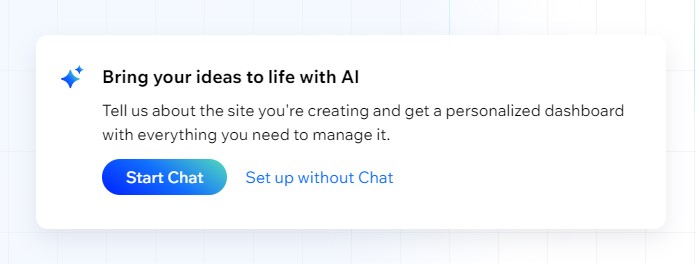
Wix is renowned for its user-friendly approach to website creation, featuring a visual drag-and-drop editor that allows real-time, WYSIWYG editing. Users can easily add, move, and edit elements without coding knowledge, benefiting from features like an intuitive interface, real-time previewing, and simple content management tools. Wix also offers built-in design assistance through its Artificial Design Intelligence (ADI), helping users create personalized websites quickly. These features make Wix an effective solution for individuals and businesses seeking to establish a professional online presence without the complexities typically associated with web development.
Verdict: Ease of Use
Wix is generally recognized for its straightforward and intuitive user experience, making it particularly suitable for beginners. It serves as a solid option for businesses that are just starting out and may not yet have a clear understanding of the range of services or products they will offer. If your primary goal is to create a website with minimal technical expertise quickly, Wix is the more favorable choice.
On the other hand, WordPress offers greater flexibility in website design, which can be advantageous if you are willing to invest some time in learning the platform. Utilizing a page builder like Breakdance can enhance WordPress’s usability, striking a balance between ease of use and advanced functionality. Ultimately, your decision should be guided by your specific needs, comfort with technology, and long-term objectives for your website.
WordPress vs Wix: Design and Customization
Both WordPress and Wix offer various design options, but their approaches to customization differ significantly. We will evaluate the themes and templates available, the customization process, and the overall flexibility each platform provides in terms of design.
WordPress Themes and Customization
WordPress provides a vast collection of themes that influence the overall design, layout, and functionality of websites. The built-in Customizer allows users to easily modify elements like text, images, colors, and layouts without needing extensive coding skills. For more advanced customization, page builders like Breakdance offer modern drag-and-drop editing capabilities, featuring 145 built-in elements and pre-designed templates for quick website creation. Breakdance’s Global Styles feature simplifies site-wide customizations from a single page.

Additionally, WordPress has introduced Full Site Editing (FSE), which allows users to edit headers, footers, and other components using blocks directly within the platform. While FSE offers a page builder-like experience, it requires compatible themes and is still being developed. WordPress’s flexibility enables users to create unique designs tailored to their needs by combining various themes and plugins, making it particularly beneficial for developers and designers. However, this flexibility can lead to a learning curve for those unfamiliar with coding or web design principles.
Wix Templates and Design Tools
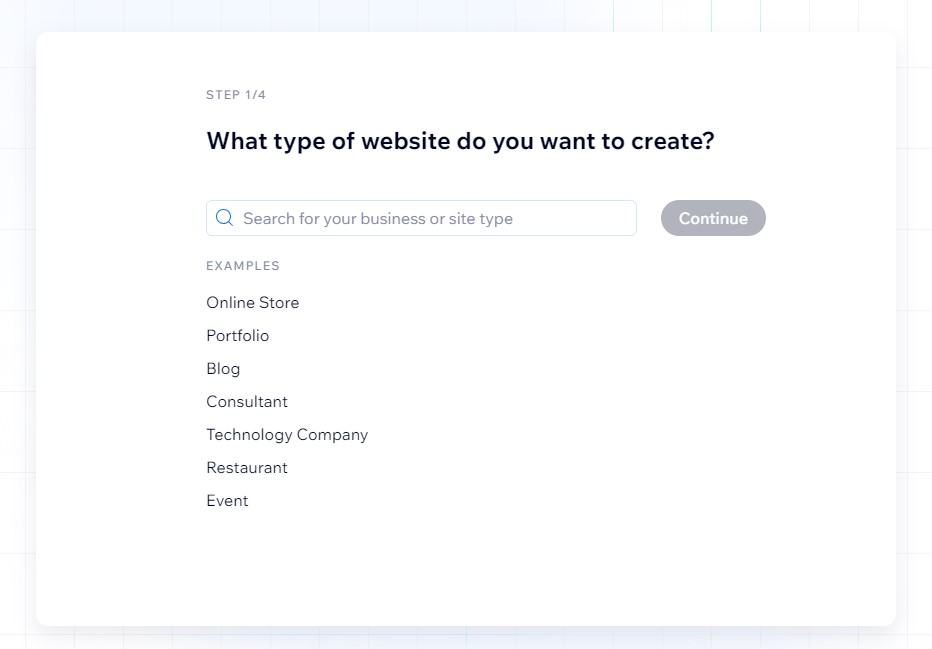
Wix offers a comprehensive design experience with its drag-and-drop editor, allowing users to customize over 900 pre-designed templates or start from scratch. The platform includes an AI-powered website builder and extensive customization options for colors, fonts, layouts, and design elements. Features like a mobile site editor, entrance animations, and slideshows enhance the design process. While Wix introduced an AI Image Creator in 2023 for generating visual assets, it’s worth noting that once a site is built, there are limitations on template switching and major structural changes. Although Wix provides numerous design options suitable for most users, those requiring highly advanced or unique customizations may find it less flexible compared to platforms like WordPress.
Verdict: Design and Customization
WordPress excels in design flexibility and customization options, offering nearly limitless possibilities through its extensive theme ecosystem and powerful page builders. It’s ideal for users seeking complete control and willing to invest time in mastering the platform. Conversely, Wix provides a more straightforward, user-friendly design experience, suited for those who want to quickly create professional-looking websites without complex customizations. The choice between WordPress and Wix ultimately depends on your specific design requirements, technical proficiency, and desired level of control over your website’s aesthetics.
WordPress vs Wix: Plugins and Apps for Extending Functionality
Extending a website’s functionality beyond basic features is crucial for creating a unique website that attracts users’ attention. It’s one of the key reasons behind building a website. To attract customers or an audience. Both WordPress and Wix offer ways to add new features and capabilities to your website through plugins (WordPress) and apps (Wix). Let’s compare the ecosystems of both platforms in terms of variety, quality, and ease of use of these extensions.
WordPress Plugins
WordPress’s plugin ecosystem is a significant strength, providing a wide range of options to enhance website functionality. With over 59,000 free plugins available in the official repository and numerous premium options from third-party developers, users can find tools for almost any need, including SEO optimization, e-commerce, and security. Installing plugins is simple and can be done directly from the WordPress dashboard, enabling users to enhance their sites without requiring extensive technical skills.
For those seeking advanced features, many developers offer premium versions of plugins, and custom solutions can be created to meet specific requirements. This flexibility allows WordPress sites to be highly customizable and scalable, making it suitable for various projects, from personal blogs to large online stores. The ability to add or remove plugins as needed ensures that websites can evolve alongside user needs.
Popular plugins like Yoast SEO, WooCommerce, and Contact Form 7 exemplify the diverse functionalities available. Yoast SEO assists with search engine optimization, WooCommerce transforms sites into e-commerce platforms, and Contact Form 7 simplifies form management. When choosing plugins, it’s essential to consider compatibility, regular updates, and user reviews to ensure optimal performance and security.
Wix App Market
The Wix App Market is a valuable resource for enhancing the functionality of Wix websites, featuring over 300 applications across various categories such as e-commerce, marketing, and social media. Popular apps include Wix Forms for creating custom contact forms, Wix Bookings for appointment scheduling, and Social Media Stream for integrating social feeds. These apps are designed to integrate seamlessly with Wix sites, offering users tools to improve their online presence and engagement.
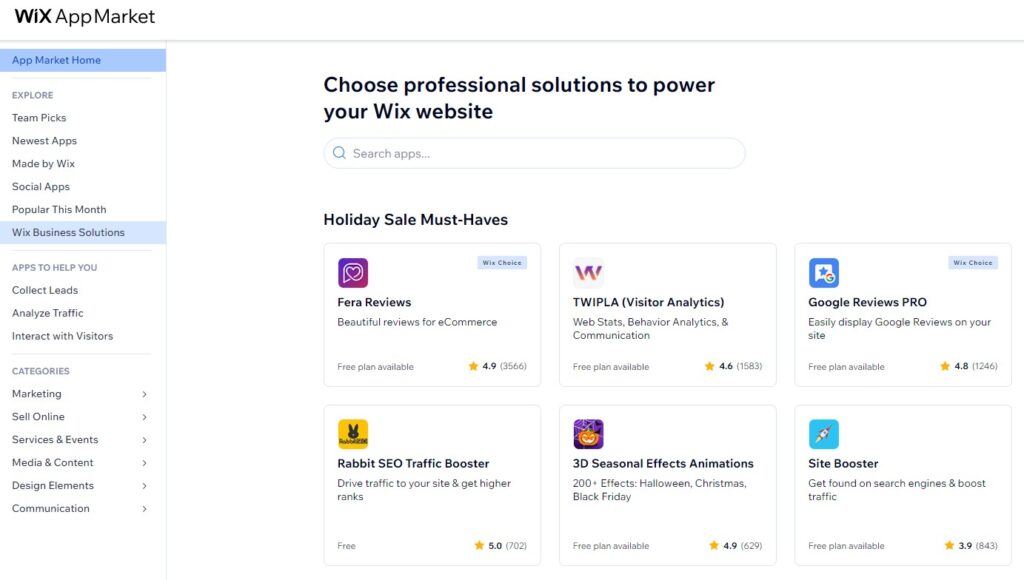
The market includes both free and premium apps, allowing users to choose options that fit their budget. While the Wix App Market offers fewer choices compared to WordPress plugins, it maintains higher quality control and better integration due to Wix’s oversight. This curated approach prioritizes user-friendliness and simplicity, making it an appealing option for those who prefer a streamlined experience over extensive customization capabilities.
Verdict: Plugins and Apps
When comparing plugins and apps, WordPress emerges as the superior choice for extending website capabilities, offering over 55,000 plugins that allow for extensive customization and scalability. In contrast, Wix has a more limited App Market with around 200 user-friendly apps focused on common functionalities like contact forms and social media integration, appealing to those who prefer a straightforward experience. Ultimately, users seeking comprehensive functionality and customization should opt for WordPress, while those prioritizing simplicity and ease of use may find Wix to be a suitable alternative.
WordPress vs Wix: eCommerce Capabilities
Both WordPress (with WooCommerce) and Wix offer eCommerce solutions, but their approaches, features, and scalability differ significantly. Let’s compare how each platform handles online store creation, product management, and sales processes.
WordPress eCommerce (WooCommerce)
WordPress does not come with built-in eCommerce capabilities, but it can be transformed into a powerful online store using WooCommerce, the leading eCommerce plugin. Installation is simple: activating WooCommerce on your WordPress site enables various product types, including physical goods and digital downloads. The plugin offers extensive customization options, allowing users to design a unique store and implement features through themes and extensions. WooCommerce also supports multiple payment gateways like PayPal and Stripe, along with flexible shipping options to meet diverse needs.
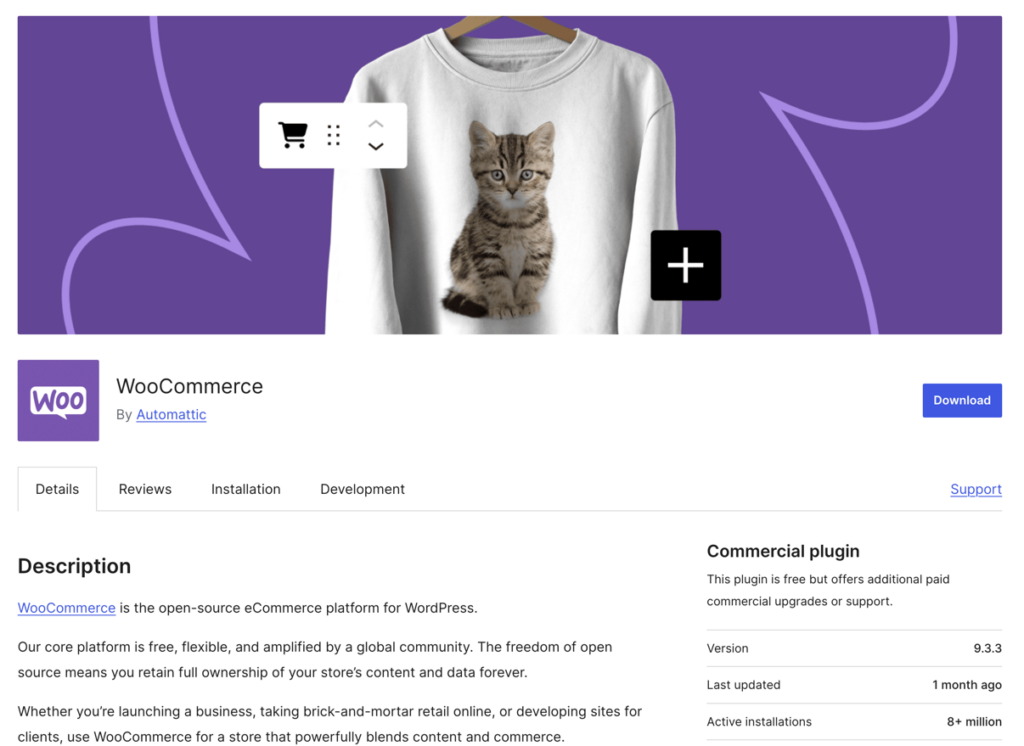
While WooCommerce provides a robust foundation for eCommerce, it may present a steeper learning curve for beginners compared to platforms like Wix. However, its flexibility allows for complete control over data and hosting choices, making it an excellent option for those seeking a customizable and scalable solution. With numerous extensions available for added functionalities, WooCommerce is well-suited for users looking to create a tailored online shopping experience.
Wix eCommerce
Wix provides a built-in eCommerce solution that allows users to easily integrate an online store into their existing websites through a straightforward setup process. It supports various product types, including physical goods, digital downloads, and services, and includes features like abandoned cart recovery and multi-channel selling on platforms such as Instagram and Facebook. This user-friendly interface is designed to enhance the shopping experience and improve sales performance.
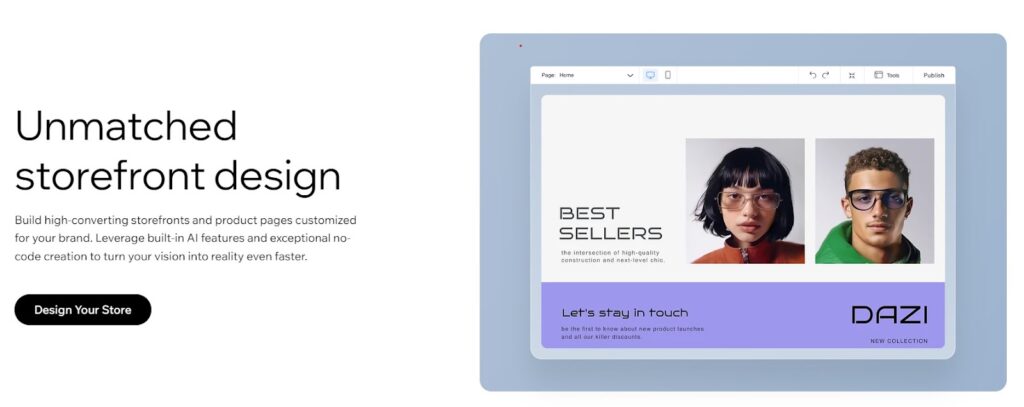
While Wix is practical for those starting in eCommerce or managing smaller online stores, it has limitations compared to more specialized platforms like WooCommerce. Its customization options and scalability may not meet the needs of larger businesses or those seeking advanced features. Therefore, while Wix serves as an accessible option for many, businesses with ambitious growth plans might consider exploring more robust alternatives for greater flexibility.
Verdict: eCommerce
WordPress with WooCommerce is often considered the best choice for eCommerce, especially for larger or more complex online stores due to its flexibility, scalability, and extensive customization options. It allows businesses to create specialized solutions tailored to their needs. In contrast, Wix eCommerce is ideal for small to medium-sized businesses or individuals seeking a simple, user-friendly setup for an online store. While Wix is accessible for beginners, it may lack the advanced capabilities needed for larger operations. Ultimately, WordPress with WooCommerce is recommended for those needing a customizable solution, while Wix serves as a practical option for smaller stores.
WordPress vs Wix: SEO and Marketing
Search Engine Optimization (SEO) and marketing capabilities play a crucial role in driving traffic and growing an online presence. Both WordPress and Wix offer SEO tools and marketing features, but their approaches and flexibility differ. Let’s compare the built-in SEO features, available tools, and overall flexibility for implementing SEO and marketing strategies on both platforms.
WordPress SEO
WordPress is renowned for its SEO-friendly framework, providing a strong foundation for optimizing websites for search engines. Its customizable permalink structure enables users to create SEO-friendly URLs that incorporate relevant keywords, enhancing user experience and search rankings. Additionally, built-in features and plugins like Yoast SEO, Rank Math, and SEOPress facilitate the generation of XML sitemaps, allowing search engines to crawl and index sites more effectively.
These popular plugins offer comprehensive tools for optimizing content, including the ability to customize title tags and meta descriptions, making it easier for search engines to interpret the content. They also support structured data implementation, enhancing rich snippets in search results, and integrate seamlessly with Google Analytics and Google Search Console for performance tracking. Overall, WordPress’s flexibility allows users to adopt tailored SEO strategies, significantly improving their site’s visibility in search engine results.
Wix SEO
Wix has significantly improved its SEO capabilities, making it a more viable option for optimizing websites for search engines. Key features include On-Page SEO tools that allow users to customize meta tags, headings, and URLs, as well as a free SEO Setup Checklist that guides users through essential steps. Wix also supports custom meta titles and descriptions, manages 301 redirects, and integrates with Google Analytics and Search Console for performance monitoring.
However, compared to more advanced platforms like WordPress, Wix has limitations in technical SEO control, such as structured data and site architecture customization. Users may find restrictions on internal linking structures and URL slugs based on their plan level. While Wix provides sufficient tools for many users, those requiring extensive customization or advanced optimizations may encounter challenges.
Verdict: SEO and Marketing
WordPress is widely recognized for its superior SEO and marketing capabilities, offering extensive flexibility and effective plugins like Yoast SEO and Rank Math for comprehensive optimization. This makes it ideal for users looking to implement advanced SEO strategies. In contrast, Wix has improved its SEO features, providing a user-friendly approach suitable for small businesses or individuals who prefer a straightforward method without technical complexities. If you seek advanced control over SEO and are willing to invest time in mastering it, WordPress is the better choice; however, if you prefer a more guided approach that covers the essentials, Wix may be more suitable.
WordPress vs Wix: Pricing and Costs
Understanding the total cost of ownership for a website is crucial when choosing between WordPress and Wix. Both platforms have different pricing structures, and the final cost can vary significantly based on your specific needs and choices. Let’s break down the pricing for both platforms.
WordPress Pricing
WordPress itself is free and open-source, but there are associated costs to consider:
- Hosting: You will need to purchase web hosting, which typically ranges from $3 to $30+ per month, depending on your needs and the provider.
- Domain Name: The annual cost for a domain usually falls between $10 to $15.
- Themes: While free themes are available, premium themes generally cost between $30 to $100 as a one-time purchase.
- Plugins: Many essential plugins are free; however, premium plugins can range from $20 to over $200 per year, depending on their features.
- Security and Backups: May require additional plugins or services, potentially adding $50 to $200+ per year
- Page Builders: Page builders like Breakdance can be downloaded for free. Premium version can cost around $100 to $300 as a one-time purchase or annual subscription
Example total costs:
- Basic blog: $50 to $100 per year
- Small business website: $100 to $200 per year
- E-commerce site: $100 to $500+ per year
These estimates can vary significantly based on individual needs and choices.
Wix Pricing
Wix offers a range of pricing plans designed to meet various user needs, from personal websites to business branding. Here’s a breakdown of their offerings:
Wix Pricing Plans
- Free Plan: $0/month, including Wix branding and ads.
- Light Plan: $204 per year ($17 per month), ideal for personal use.
- Core Plan: $348 per year ($29 per month), suitable for freelancers and entrepreneurs.
- Business Plan: $432 per year ($36 per month), designed for comprehensive online branding.
- Business Elite Plan: $1908 per year ($159 per month), features advanced eCommerce and unlocks the advanced developer platform.
All paid plans include hosting and a free domain for the first year. Pricing may vary by location and current promotions. Note that most plans are billed annually, which is important for budgeting considerations. For users needing extensive features, Wix also offers an Enterprise Plan tailored to specific business needs, but pricing details are not publicly disclosed.
Verdict: Pricing and Costs
WordPress obviously gives you far more for your money, with the costs mostly being scalable depending on your needs. Wix, however, locks you into their platform and pricing, which means you’ll end up paying more without the ability to pick and choose which premium features you need.
Conclusion: Which Platform You Should Choose for Your Website?
When choosing a platform for your website, consider your specific needs, as both WordPress and Wix offer unique advantages. WordPress is ideal for users needing complete control over design and functionality, making it suitable for large eCommerce sites and content-heavy blogs, though it requires some technical knowledge for extensive customization. In contrast, Wix is perfect for individuals or small businesses looking to create basic websites quickly with minimal technical expertise, thanks to its user-friendly drag-and-drop interface and all-in-one hosting solution. Ultimately, your decision should reflect your website’s requirements, technical skills, budget constraints, and long-term goals.
